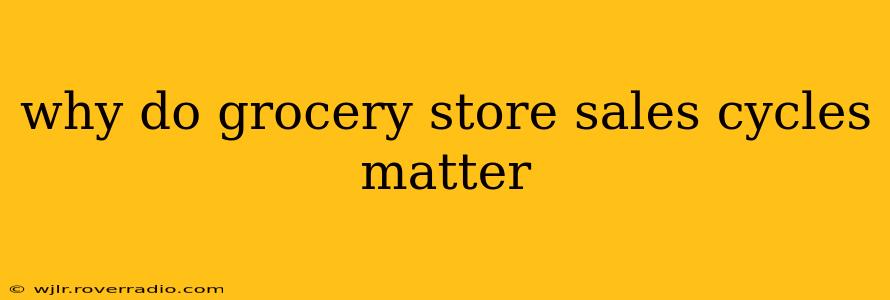Grocery store sales cycles are the heartbeat of the retail food industry. Understanding these cyclical patterns is crucial for both consumers and businesses alike. These cycles, driven by a variety of factors, significantly impact pricing, product availability, and ultimately, your grocery budget. Ignoring these cycles could mean missing out on significant savings or facing frustrating empty shelves. This post will delve into why grocery store sales cycles matter, exploring the underlying reasons and providing insights for navigating them effectively.
What Drives Grocery Store Sales Cycles?
Several interconnected factors contribute to the predictable rhythms of grocery store sales:
-
Manufacturer Promotions: Food manufacturers frequently offer promotional deals to retailers, incentivizing them to stock and feature specific products. These promotions often align with seasonal changes, holidays, or the introduction of new products. This is a primary driver of sales cycles, as retailers pass these savings on to consumers to boost sales volume.
-
Retailer Strategies: Grocery stores themselves employ strategic sales cycles to manage inventory, clear out slow-moving items, and attract customers. They might run weekly specials, themed sales (like "back to school" or "summer grilling"), or loyalty program promotions to encourage repeat business and increase basket size.
-
Seasonal Demand: Certain products are in higher demand during specific times of the year. Think pumpkin spice everything in the fall, or increased sales of grilling supplies during summer. These seasonal fluctuations influence how retailers stock and price their goods.
-
Competition: The intensely competitive nature of the grocery industry means retailers constantly monitor and react to their competitors' pricing and promotions. A sale at one store might trigger a price war, benefiting the consumer in the short term but potentially impacting profitability for all involved.
How Do Grocery Store Sales Cycles Impact Consumers?
Understanding these cycles empowers consumers to make smarter purchasing decisions:
-
Significant Savings: Sales cycles offer substantial savings, particularly on staple items. By strategically planning your grocery shopping around these cycles, you can significantly reduce your overall food costs.
-
Access to Variety: Sales often highlight less-familiar brands or new products, giving consumers the chance to try different options without committing to full-price purchases.
-
Better Inventory Management: By knowing which items tend to go on sale when, you can plan your meals and shopping lists more efficiently, minimizing food waste.
How Do Grocery Store Sales Cycles Impact Businesses?
The cycles are vital for grocery store operations and profitability:
-
Inventory Turnover: Sales help move inventory, preventing spoilage and freeing up storage space for new stock.
-
Customer Loyalty: Regular sales and promotions can incentivize customer loyalty and drive repeat business.
-
Competitive Advantage: Effective sales management can provide a competitive edge, attracting more customers and increasing market share.
What Are Some Common Sales Strategies Used By Grocery Stores?
-
Weekly Ads: Many grocery stores release weekly ads highlighting their sales and promotions.
-
Loyalty Programs: These programs reward frequent shoppers with discounts, exclusive offers, and personalized deals.
-
Targeted Promotions: Stores might run targeted promotions based on customer demographics or purchase history.
-
Bundling: Offering discounts on multiple items purchased together is a common sales tactic.
How Can I Best Utilize Grocery Store Sales Cycles?
-
Plan your meals: Plan your meals around the items on sale that week.
-
Check weekly ads: Compare prices between stores and take advantage of the best deals.
-
Use couponing apps and websites: Combine sales with coupons for maximum savings.
-
Be flexible: Be open to trying new brands or products that are on sale.
Are there specific times of year when grocery store sales are more prevalent?
Yes, there are generally more sales around major holidays like Thanksgiving, Christmas, and Easter, as well as during back-to-school season and summer grilling season. These periods often see increased demand and retailers leverage the opportunity to offer special promotions.
How can I predict when certain items will go on sale?
While it's impossible to predict with complete accuracy, paying close attention to past sales patterns and observing weekly ads will give you a better idea of when certain products typically go on sale. Many grocery stores follow predictable cycles, making it easier to anticipate future price reductions.
By understanding the intricacies of grocery store sales cycles, both consumers and businesses can make informed decisions, optimize their spending, and achieve greater success in the competitive landscape of the food retail industry. This rhythmic ebb and flow of prices and promotions offers an opportunity for smart shopping and effective business strategies, if understood and utilized properly.
